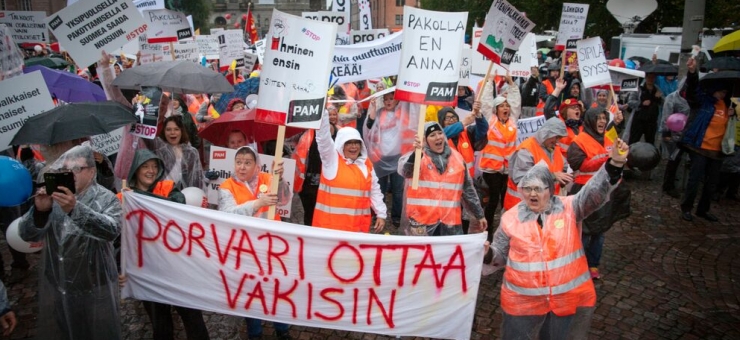Workers Strike Against Anti-Union Governments
November 1, 2015
(This article first appeared in the November/December 2015 issue of The American Postal Worker magazine.)

Protesting their government’s right-wing, anti-union agenda, workers in India and Finland went on strike in September.
On Sept. 2, approximately 150 million Indian workers representing 10 major trade unions – primarily in the banking, manufacturing, construction and coal mining industries – walked off the job, representing approximately one quarter of the country’s population.
Public transit was disrupted, with long lines of commuters and students left waiting at bus stops in many cities, including the capital, Delhi. Travelers were also left stranded at railway stations and airports.
To prepare for the strike, a large number of schools and businesses were closed in West Bengal and Kerala, where unions have strong support, and public transportation was disrupted.
Workers went on strike to protest the “pro-business” policies of the Narendra Modi-led government that they say will put their jobs at risk and hurt the general population. The unions demanded that the government postpone plans to sell its stake in state-run companies and change labor laws.
Rain Doesn’t Stop Finnish Protests
On Sept. 18, despite heavy rains, tens of thousands of protesters filled the streets of Helsinki, Finland’s capital, to protest proposed anti-union legislation. Finland’s government is proposing restrictions on collective bargaining rights and the right to organize, as well as cuts in vacation time and paid holidays.
Throughout the country, hundreds of thousands of supporters refused to work between 11 a.m. and 1 p.m., in an act of solidarity.
Ann Selin is president of Finland’s biggest union, PAM, as well as president of UNI Global Union, which supported the strike.
“The government is conducting a hard policy to please the employers. For employees, this is a brutal attack,” Selin said.
“It is totally impossible that in a society based on mutual agreements, the government should dictate the maximumterms of sectoral collective agreements,” she concluded.
New Zealand Postal Workers Feel Effects of Privatization
Postal workers in New Zealand are reeling from the effects of privatization, even though the transition to a private mail system took place almost two decades ago.
New Zealand Post’s recent annual financial results are dire, and workers are concerned that the already slashed services they provide will be outsourced.
New Zealand Post was a state-owned enterprise – much like the USPS – but it was privatized in 1987, starting off with 1,244 post offices, later rebranded as PostShops.
By February 1988, nearly half of the PostShops closed, due to the expiration of government subsidies. Although there are more retail outlets than ever that sell stamps, today there are only 297 PostShops.
Less Service, Fewer Jobs
New Zealand Postal Workers Union spokesperson John Maynard explained that New Zealand Post is forced to do the leg work for its competitors – who in turn select what work they want the Post to carry out.
“They’re running down the service,” Maynard said. “We’re also worried that they may be looking at contracting out the postie jobs.”
Maynard said that the losers are postal customers – especially senior citizens and those without access to computers. With post offices being franchised and mail boxes being consolidated to cluster boxes that are located far away from homes, customers are being disadvantaged.
“We want people to understand, to be able to come make representations to a public enquiry that their post offices are being pulled out, against the will of a lot of people and the knowledge of a lot of people in the community,” he explained. “New Zealand Post is making it harder for people to post letters, so that’s one area that we want looked at.”



